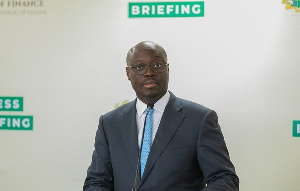The Kumasi Centre for Collaborative Research (KCCR) in tropical medicine has come out with a new drug - Doxycycline - capable of offering a more effective and permanent treatment of people suffering from onchocerciasis (oncho) or river blindness.
Professor Ohene Adjei, Deputy Director of the KCCR, said unlike Ivermectin, the current drug used in treating oncho, the new drug kills the adult worms which are the main source and cause of the oncho disease.
Prof. Adjei announced this at a press briefing held by the KCCR in Kumasi on Friday to enlighten the public about the centre's achievements in its five years of existence and plans for the enhancement of medical care in the system.
He said the new drug was identified and evolved by the centre a year ago and results of their investigations have already been submitted to the World Health Organisation (WHO), which has accepted and approved it.
"After a few trials, the new drug will be expected to be passed on to the Ministry of Health for distribution and usage," he said.
Prof. Adjei said what makes Doxycycline unique is it "eliminates the older and adult worms and once this is done, there is no way the worms can be produced again to cause any havoc".
Dr Thomas F. Kruppa, Director of the KCCR, touching on Buruli ulcer, said since there has not yet been any concrete scientific proof of the location of the organism that causes the disease, it would still be difficult coming out with a treatment for it.
"Though some people say the Buruli ulcer organism emanates from the water and others say the soil, this cannot be said to be true since there has not been any scientific proof on it yet."
Dr Kruppa said, this notwithstanding, the KCCR has delved into serious research through the exploration of various techniques to establish the real location of the Buruli ulcer organism with the view to coming out with a proper treatment for the disease.
He said in its five years of existence, the KCCR had initiated 14 projects in the area of malaria, Buruli ulcer, elephantiasis, tuberculosis, onchocerciasis and deafness, among others, all with funding and grants from the European Union, Germany Ministry of Education and Research and Bernhard Nocht Institute for Tropical Medicine, Germany.
General News of Monday, 5 August 2002
Source: Accra Mail












